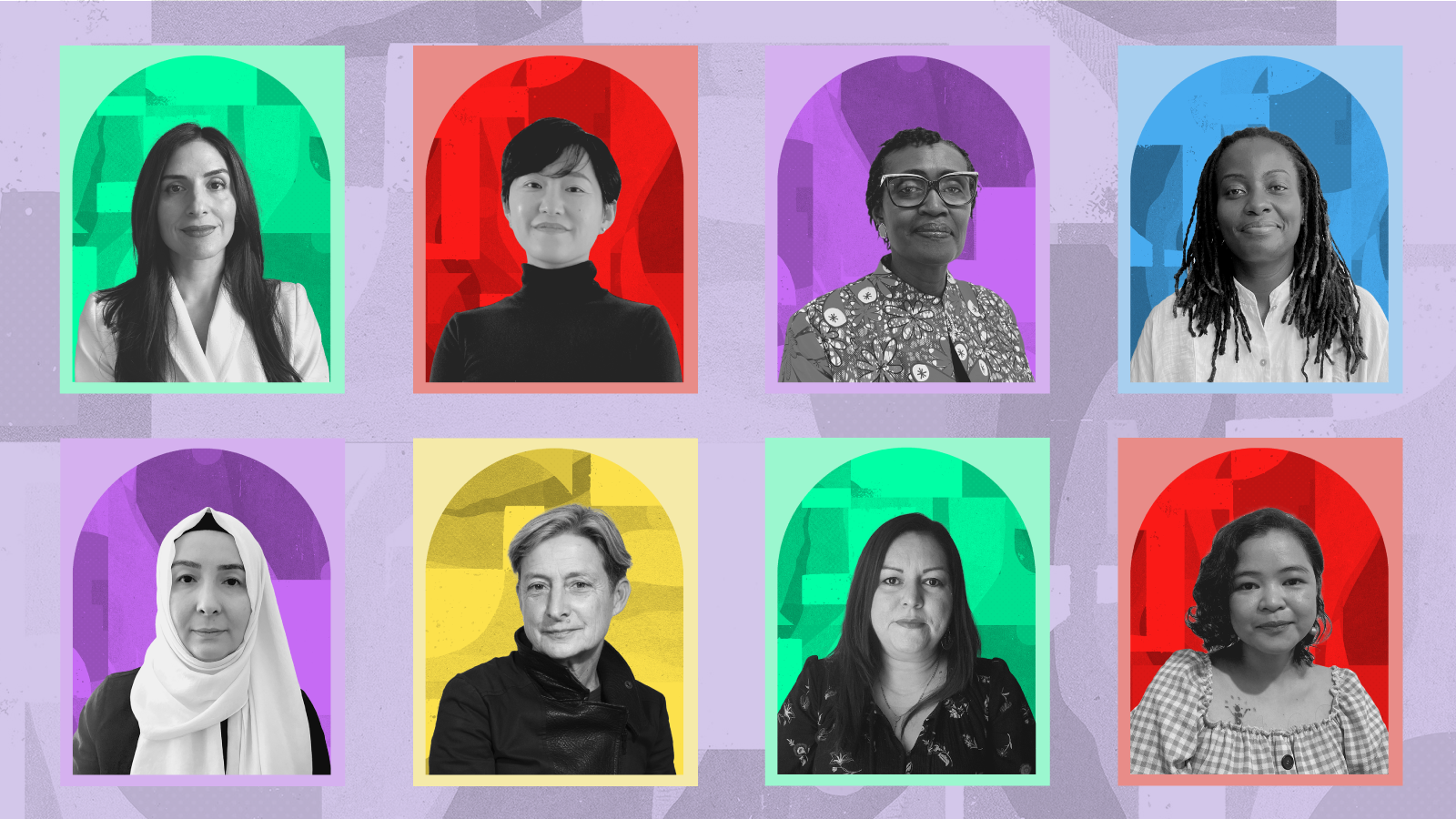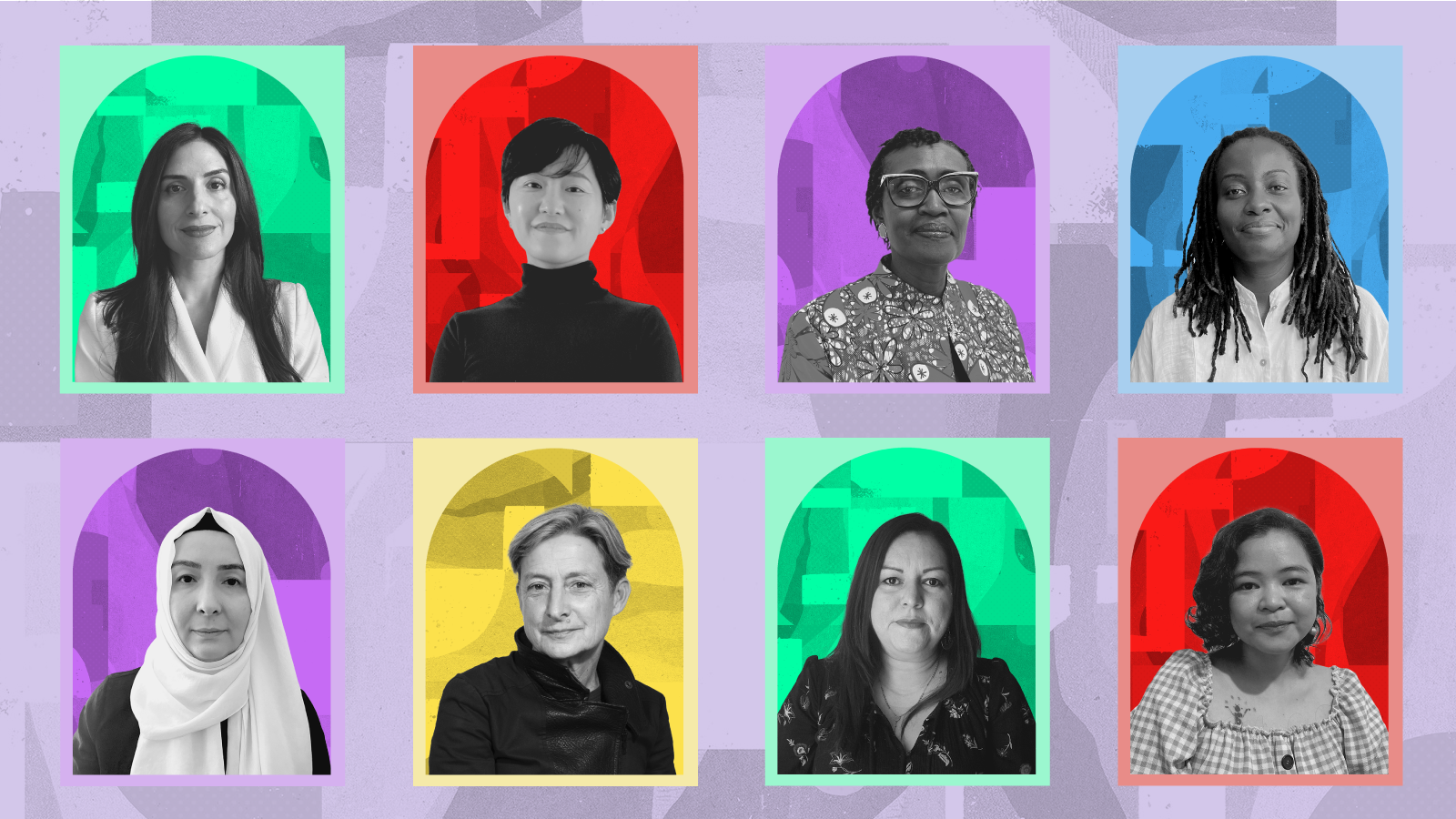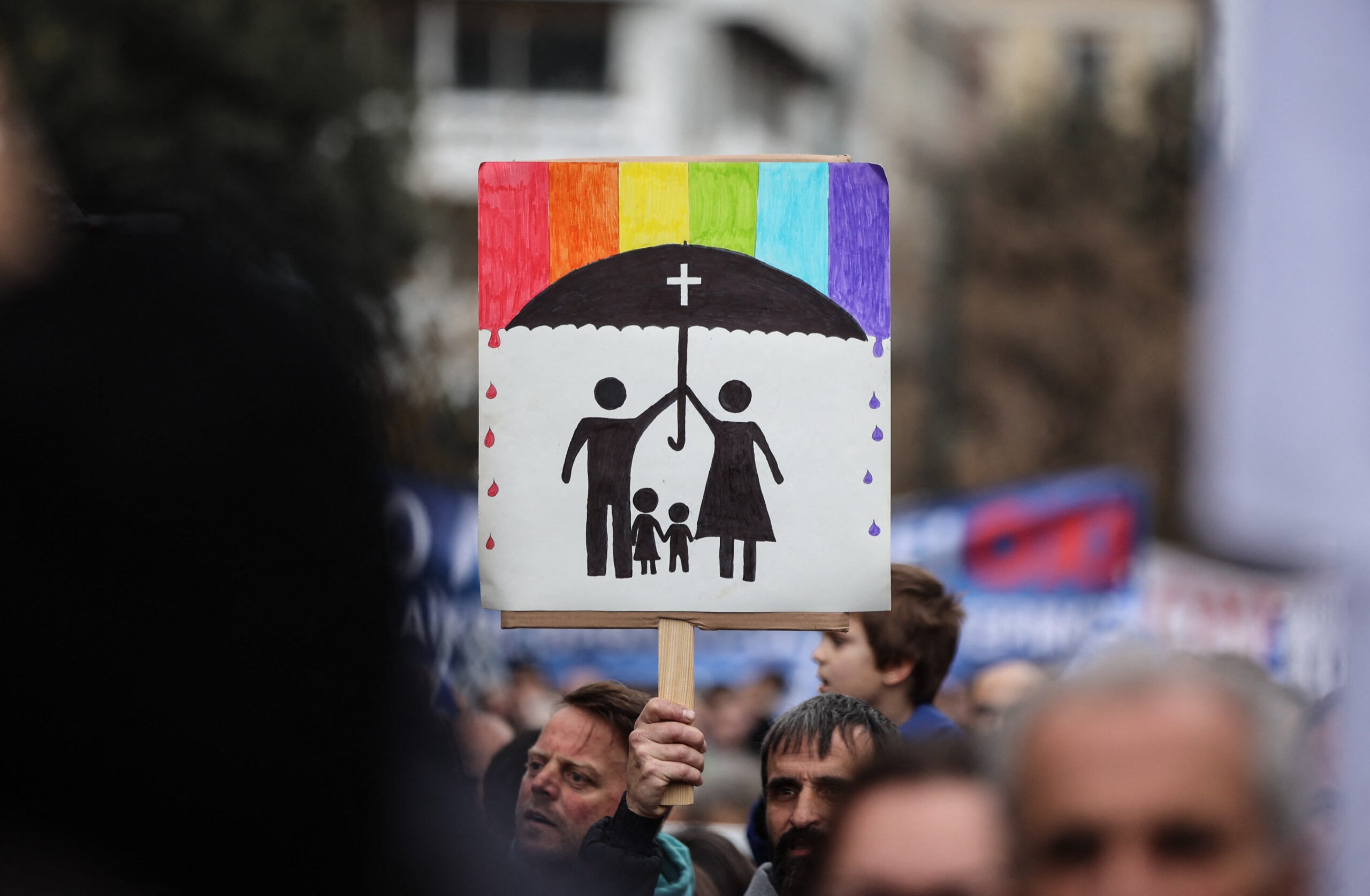
Over the past several decades, in every part of the world, hard-won strides have been made towards equality of access, opportunity and outcome for women and girls. Though less universal, there have also been important legislative and cultural shifts to recognize LGBTQ+ people and protect them from discrimination. But a backlash is growing and spreading.
From the US to Uganda, comprehensive sexuality education (CSE) in schools, sexual and reproductive rights and LGBTQ+ rights have all come under attack.
Researchers of this phenomenon refer it as the “anti-gender movement” and warn it threatens women’s rights, gender and sexuality diversity, and democracy itself.
So, what is the anti-gender movement? Here’s what you need to know.
What is the anti-gender movement?
The anti-gender or anti-rights movement is an umbrella term that refers to social movements mobilizing opposition to what they call “gender ideology,” “gender theory” or “genderism.”
Though no singular definition exists for these terms, in practice, these movements are opposed to the same things, which the United Nations identified as the rights of LGBTQ+ people, “reproductive rights, sexuality and gender-sensitive education in schools, and the very notion of gender.”
The authors of a 2020 UN Human Rights report entitled “Gender Equality and Gender Backlash,” identify three specific conservative groups who are behind these movements: governments, religious groups, and civil society groups. Together, they have formed “national and transnational alliances with shared strategies and objectives.”
While their exact targets and arguments vary, proponents of anti-gender ideology generally agree that the concept of ‘gender’ is dangerous because it is changing the way our societies are structured. They view “traditional” social units – such as the male-headed nuclear family of a husband, wife, and children – as the only true or moral way to live.
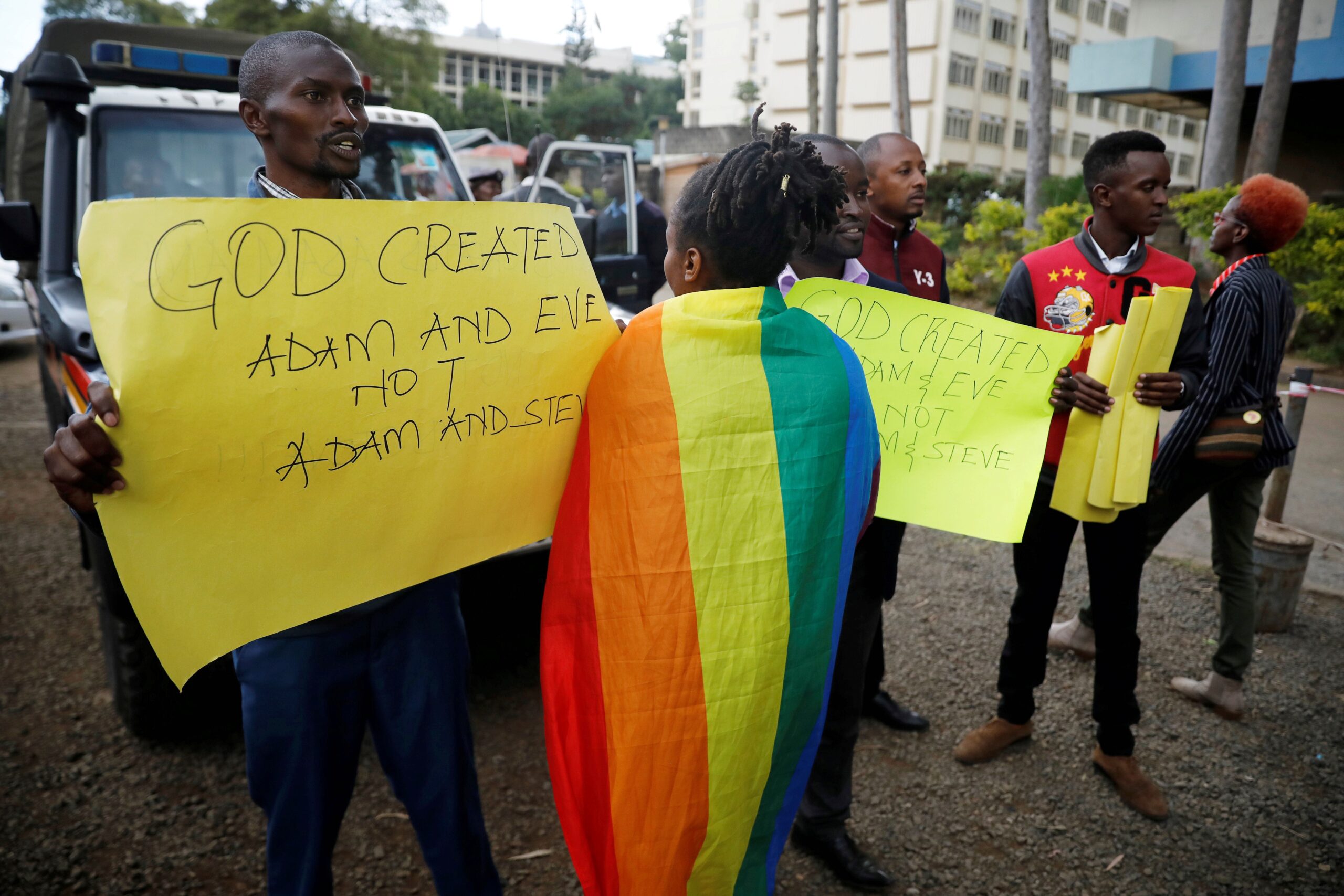
An LGBTQ+ activist walks past anti-gay rights protesters holding placards, after a ruling by Kenya's High Court to uphold a law banning gay sex, in Nairobi, Kenya, on May 24, 2019. Baz Ratner/Reuters
Notably, anti-gender movements are also connected to the political shifts being witnessed around the globe, away from liberal democracy and towards right-wing populism. As Hungarian historian Andrea Pető puts it: “The anti-gender movement is not merely another offshoot of centuries-old anti-feminism but is a fundamentally new phenomenon that was launched for the sake of establishing a nationalist neoconservative response.”
The potential gains that come from playing on fears brought on by societal changes have added anti-gender rhetoric firmly to the political playbook. Donald Trump, who once celebrated the inclusion of transgender women in his beauty pageant, is now campaigning for president by vowing to “defeat the cult of gender ideology” and protect children from “left wing radical racists and perverts who are trying to indoctrinate our youth.”
Where in the world has anti-gender ideology gained the most traction?
The anti-gender movement is now present in almost all countries around the world, and the number of people supporting it is growing. This poses a significant challenge to not just advancing human rights protection, but also to retaining the gains already made.
Let’s take a look at some of the countries where the anti-gender movement has been most successful:
In the US, reproductive rights are being rolled back, following the Supreme Court’s reversal of Roe V. Wade in 2022, which had protected the constitutional right to abortion for decades. Risa Kaufman, Director of US Human Rights at the Center for Reproductive Rights, described this decision as a “devastating setback.”
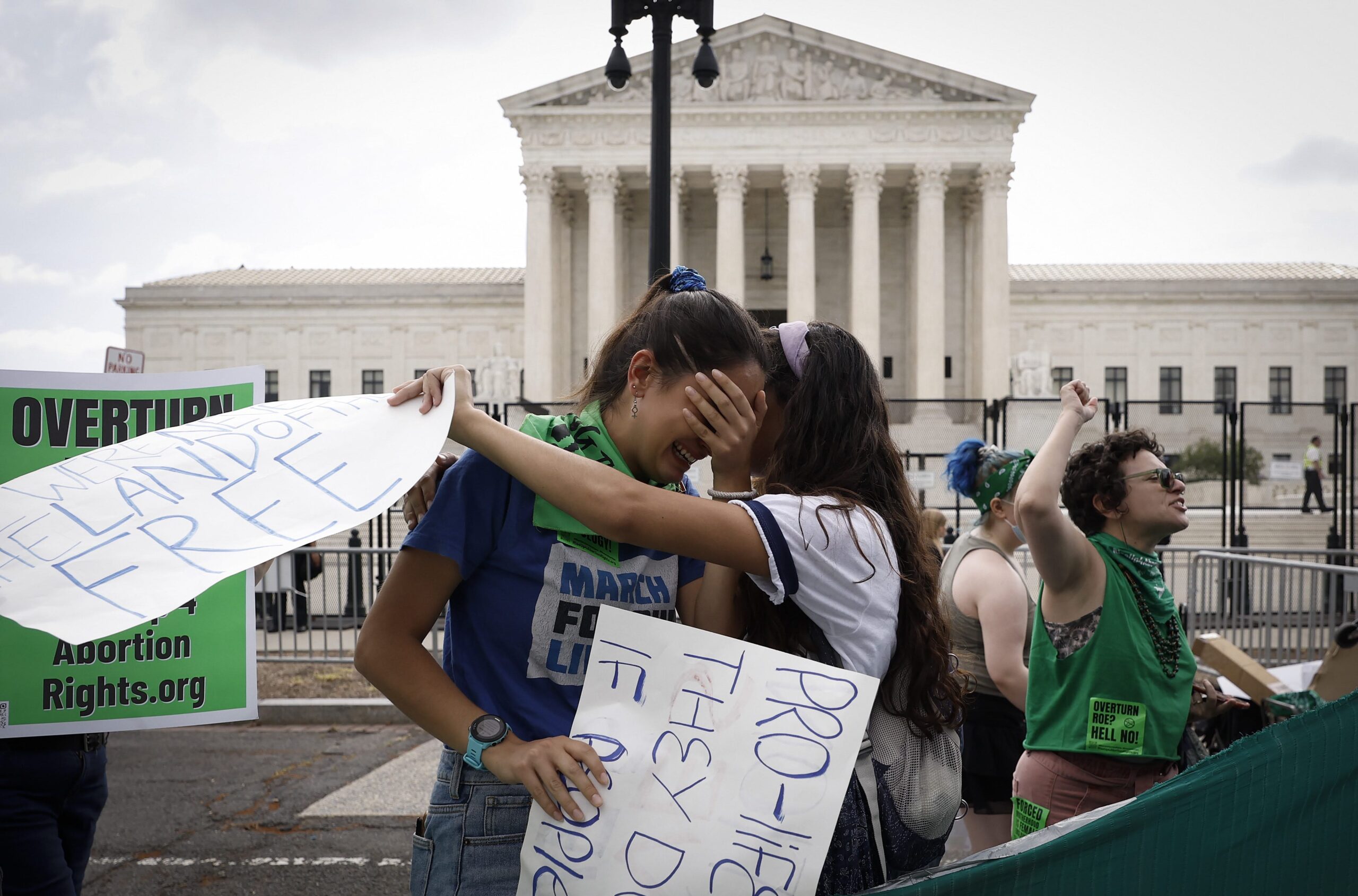
In front of the US Supreme Court on June 24, 2022, abortion rights activists react to the Dobbs v Jackson Women’s Health Organization ruling which overturned Roe v. Wade. Anna Moneymaker/Getty Images
Meanwhile, hundreds of bills targeting LGBTQ+ people – especially transgender people – have been introduced in state legislatures in recent years. At least 510 anti-LGBTQ+ bills were introduced in 2023, a new record according to data from the American Civil Liberties Union (ACLU), and nearly three-times the number were introduced in 2022. By the end of 2023, 84 bills were signed into law in 23 states.
“Anti-gender movements are connected to the political shifts witnessed around the globe, away from liberal democracy and towards right-wing populism”
In Turkey, The People’s Alliance, led by President Recep Tayyip Erdoğan’s Justice and Development Party (AKP), won a majority in the 2023 elections following a campaign which heavily used anti-gender rhetoric. Erdoğan even said at rallies that his coalition is “against the LGBT” and “a strong family means a strong nation”; he was re-elected as president. Just two years before, the country withdrew from the Istanbul Convention, the world’s leading treaty on gender-based violence, because it threatens “family values” and “normalizes homosexuality.”
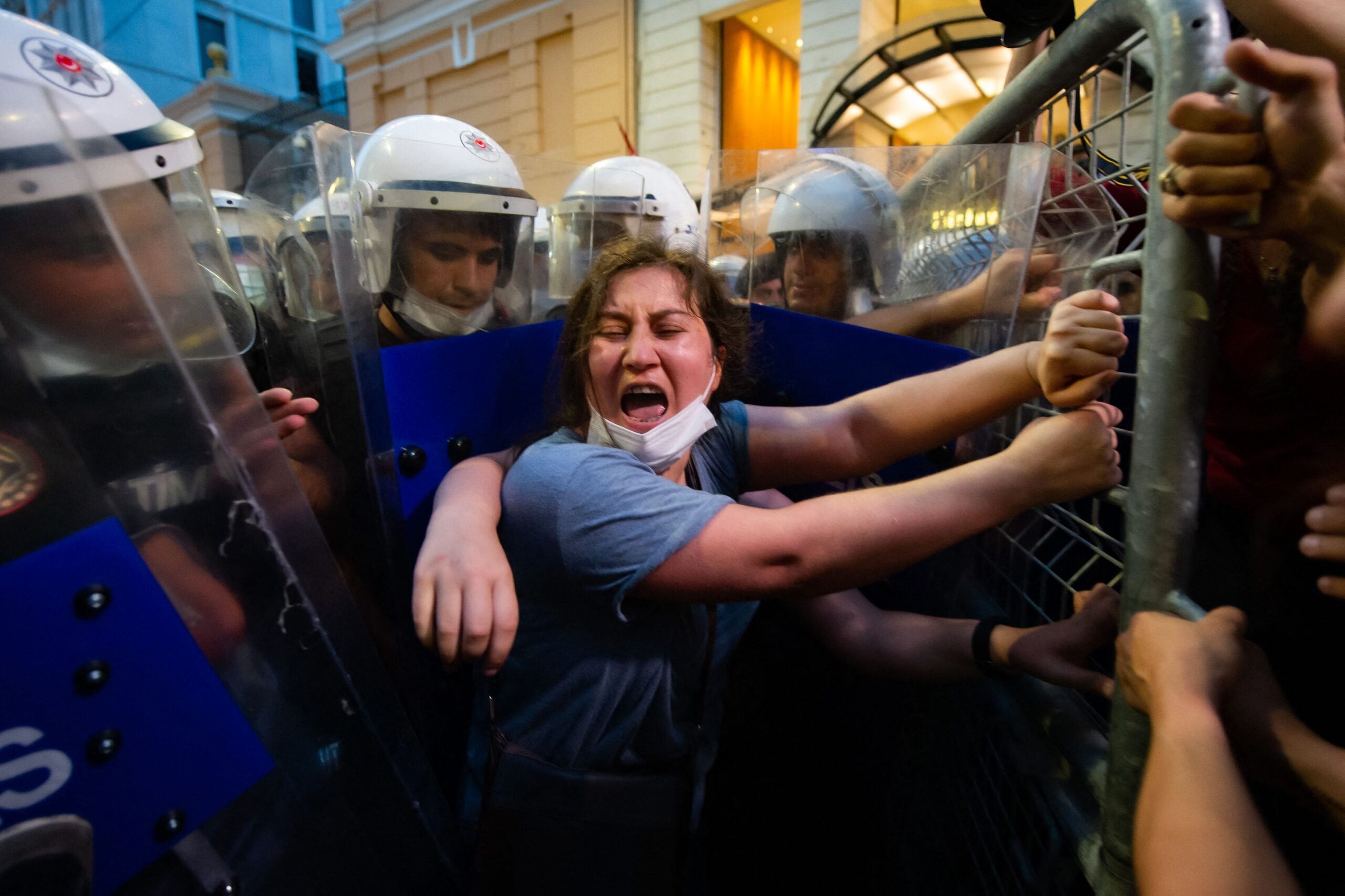
Women demonstrators in Istanbul clash with Turkish police on July 1, 2021, as they protest against Turkey's decision to withdraw from the Istanbul Convention. Yasin Akgul/AFP/Getty Images
In Ghana, a new anti-homosexuality law was passed by parliament just last month. The Human Sexual Rights and Family Values Act criminalizes LGBTQ+ relationships, as well as anyone supporting LGBTQ+ rights. UNAIDS executive director Winnie Byanyima warned that the law “will negatively impact on free speech, freedom of movement and freedom of association” and “obstruct access to life-saving services, undercut social protection, and jeopardize Ghana’s development success.” A recent CNN investigation uncovered alleged links between a US nonprofit and the drafting of the homophobic law. The group denied those links, claiming they were simply promoting “family values”.
In India, anti-gender proponents are closely linked with Hindu nationalist movements, known as Hindutva. Hindu nationalism has long relied on gender norms, encouraging women to focus on being mothers to ensure the Hindu population of India does not decrease. Traditional patriarchal social structures – where men lead and women follow – are held up as part of India’s “golden past,” to which Hindutva followers want to return.
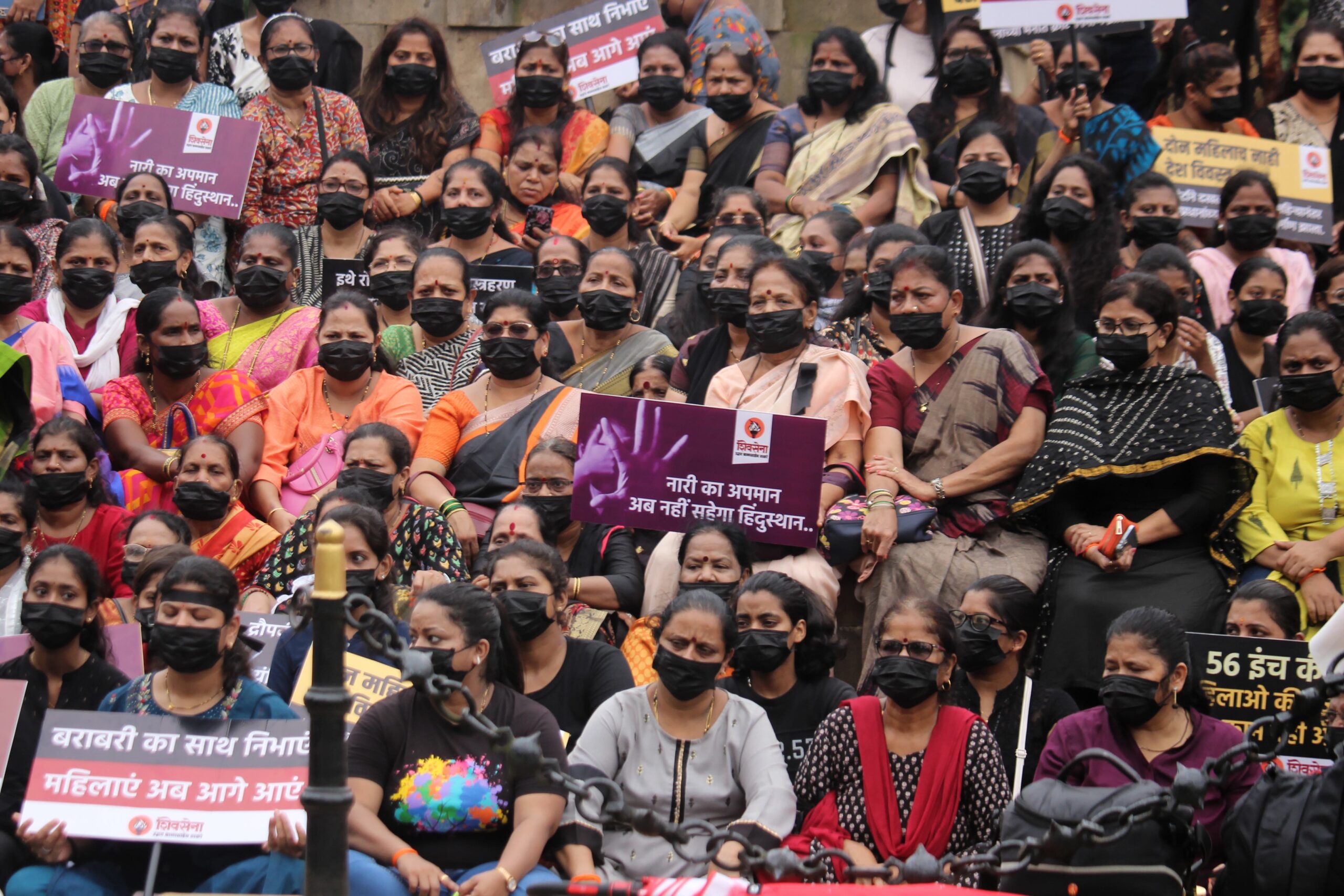
People wearing black masks gather to raise awareness of violence against women, in Mumbai, India, on August 2, 2023. Himanshu Bhatt/NurPhoto/Getty Images
When and where did the anti-gender movement begin?
The anti-gender movement emerged in the early 1990s in response to international conferences that catalyzed recognition of gender at the United Nations and accelerated progress on gender equality, including the recognition of sexual and reproductive rights.
Historically, the concept of “the family,” which the contemporary anti-gender movement seeks to defend, can be traced back to colonial English and European ideas of the heterosexual nuclear family as the backbone of society.
In the early 2000s, the Catholic Church began sounding the gender alarm, claiming that “violent attacks on the institution of the family” were taking place. The Church perceived new laws on same-sex marriage and abortion as corroding morals. Pope John Paul II declared that “misleading concepts concerning sexuality and the dignity and mission of the woman” were driven by “specific ideologies on ‘gender.’” This led to the emergence of the term “gender ideology,” which conservative and fundamentalist groups began using to refer to the broad swathe of issues they oppose, including LGBTQ+ rights, reproductive rights, and gender equality.

Men pray and display posters of the Virgin Mary during a demonstration during a demonstration conducted mainly by men against abortion, premarital sex and women's modest clothes in Zagreb, Croatia on April 1, 2023. Denis Lovrovic/AFP/Getty Images
A decade later, anti-gender protests emerged in parts of Europe, with supporters initially mobilized by the Catholic Church. Though Pope Francis may differ from his predecessors in his view on gay people in church, on March 1, 2024, he told participants at a Vatican conference that “the ugliest danger is gender ideology” because it erases differences between men and women. “Cancelling out the differences means cancelling out humanity,” the pontiff said.
And so, in 2024, for anti-gender actors, the term “gender” now encompasses everything from the concept of gender itself, to gender studies, legal protections for transgender people, survivors of domestic violence and rape, and women and girls in general. In fact, according to the Association of Women in Development, the concept is now being used to attack all sorts of progressive “struggles,” including even environmental issues.
How does the anti-gender movement push its agenda?
Anti-gender arguments broadly fall into three groups: nationalist (or cultural), religious, and political. The three frequently overlap. In Poland, for example, politician and former Prime Minister Jarosław Kaczyński said in 2019 that he believed the “LGBT movement and gender threaten our identity, threaten our nation [and] endanger the Polish state.”
In nationalist arguments, women and LGBTQ+ rights are often positioned as being foreign imports. In China, feminist ideas have been called “unpatriotic”, and outspoken women online are frequently attacked by nationalist trolls for their allegedly anti-China views.
Meanwhile in Kyrgyzstan, in 2021, nationalists attacked women protesting gender-based violence, with one man saying he acted because “Western values are being imposed on our young people. If they want to promote these values, let them do it in some other country.”
Religious arguments are driven by conservative and fundamentalist interpretations of religion that uphold strict ideas around gender and sexuality.
In Indonesia and Malaysia, 2023 concerts by British band Coldplay were met with opposition from Islamic groups. Even the Indonesian Ulama Council, the country’s top Islamic scholars’ body, alleged Coldplay would promote LGBTQ+ rights, and protesters gathered outside the band’s concert in Jakarta, some holding posters saying Coldplay were damaging Indonesia’s “faith and morals”. In Malaysia, organizers reportedly prepared a “kill switch” in case the band did anything to offend “local morals and sensibilities.”
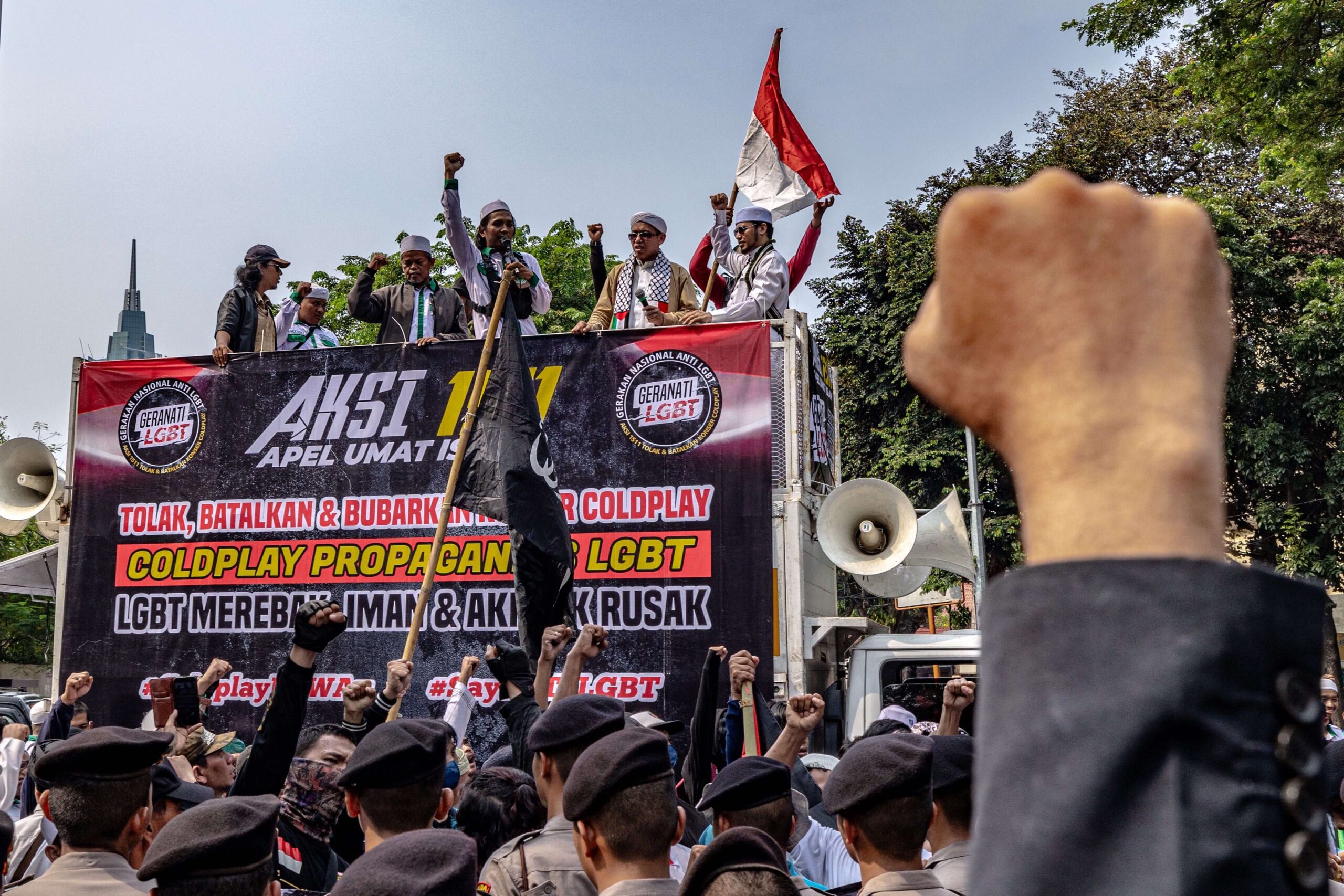
Jakarta, Indonesia, November 15, 2023: Protesters demand the cancellation of a concert by British rock band Coldplay, which they say supports LGBTQ+ rights. Mas Agung Wilis/AFP/Getty Images
For right-wing and far-right politicians, the anti-gender movement offers a way to stir up what is known as a “moral panic.” A moral panic is a widespread but exaggerated fear that a group, person, or concept poses a threat to society.
For example, in Brazil, former President Jair Bolsanaro, during the course of his 2018 presidential campaign, accused his opponent of making “gay kits” for schools while education minister. He also accused teachers of “indoctrinating” children through gender and sexuality education. There was no evidence that this was in fact the case.
While the strategies used by anti-gender movements varies from place to place, one distinctive trait of this trend is just how networked the different actors are. For example, according to the UN Research Insitute for Social Development, the World Congress of Families – a US-based group which has been called “one of the most influential American organizations involved in the export of hate” – has held events to connect “pro-family” actors in cities as diverse as Mexico City, Tblisi, Accra, Amsterdam, Madrid, and Geneva since 1997.
"US-based organizations are important funders for anti-gender movements globally”
Another US-based organization, Family Watch International, has mobilized campaigns against comprehensive sexuality education across East and Southern Africa. Family Watch International is also named in a CNN investigation as having “hosted key politicians pushing anti-LGBTQ laws” – though the organization denies involvement in formulating legislation.
Who funds the anti-gender movement?
In addition to having clear links across countries and regions, the anti-gender movement is also funded transnationally.
A 2021 trends report, produced by the Observatory on the Universality of Rights (OURS), lists four funding sources: ultra-conservative grant-makers and private donors; religious institutions; businesses and corporations; and funding from other organizations, such as state-funded institutions.
US-based organizations are important funders for anti-gender movements globally. The Global Philanthropy Project found that at least $1billion was channelled overseas by just 11 US-based organizations to fight LGBTQ+ and women’s rights between 2008 and 2017. The authors of the report state that this amount “is surely an undercount.”
Not all sources of funding to anti-rights groups are intentionally in support of their agenda. Reporting by CNN As Equals shows that aid from donors such as the US and Germany had also flowed to religious organizations in Ghana which support the country’s new anti-LGBTQ+ bill, which was unanimously passed on February 28.
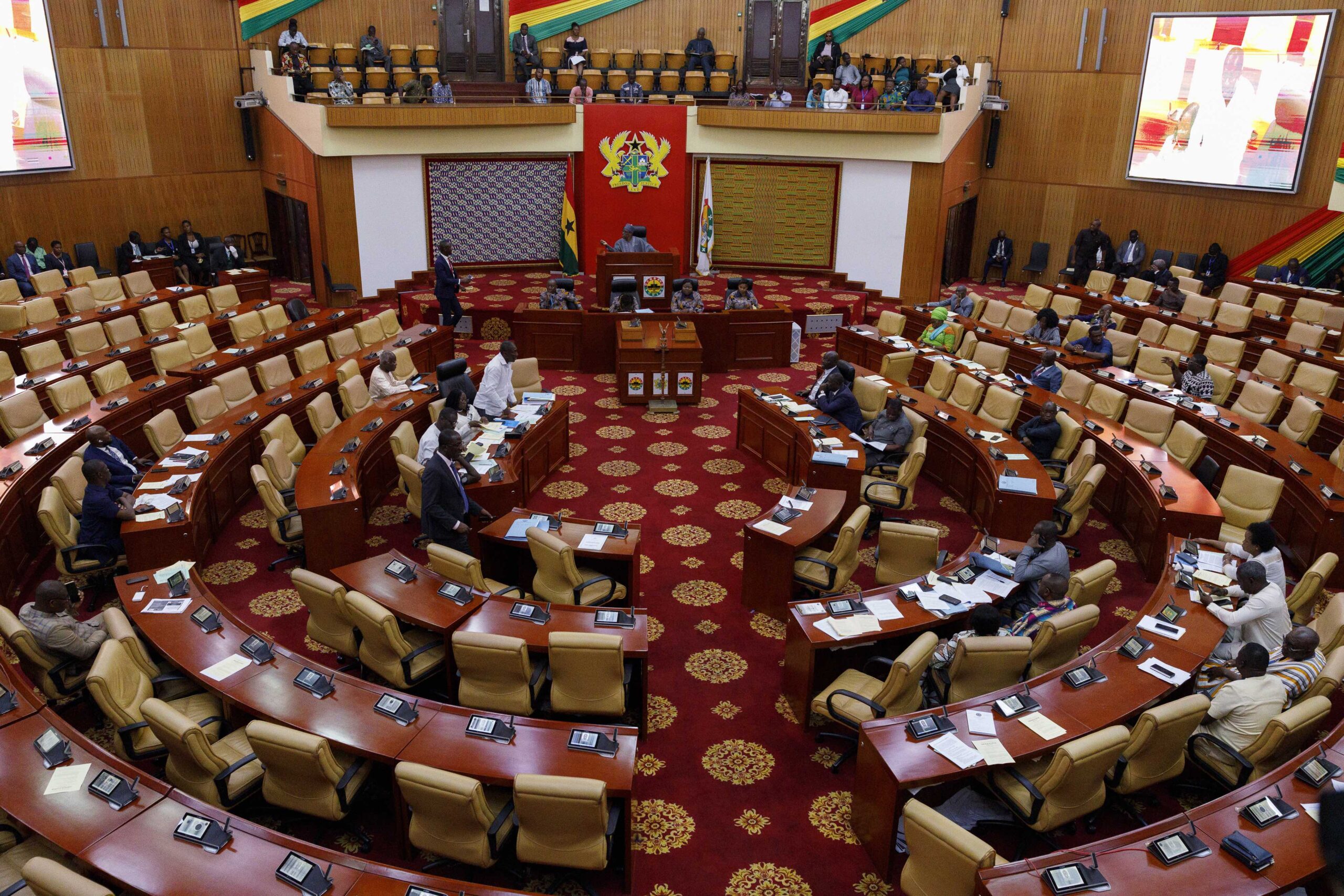
On February 28 Ghana's parliament passed an anti-LGBTQ+ bill that criminalizes members of the LGBTQ+ community as well as its supporters. Misper Apawu/AP
What impact is the anti-gender movement having on human rights and democracy?
From Peru to Russia, women’s and LGBTQ+ organizations and activists are increasingly being criminalized, arrested, physically or sexually attacked, and even killed for their work.
1 in 4 activists from 67 countries surveyed in 2023 by The Kvinna till Kvinna Foundation – which has been monitoring the security situation for women human rights defenders for more than a decade – said they have received death threats for their work, and 58% said their own governments were behind the threats.

Women hold candles and flowers during a "Dark Valentine" vigil to demonstrate against the rising cases of femicide, in Nairobi, Kenya, on February 14. Brian Inganga/AP
Attacks on defenders create an atmosphere of fear, further restricting activism and especially discouraging ordinary citizens from standing up for their rights, while new laws actively prevent people from speaking up.
Indonesia’s new Criminal Code, ratified in 2022, sets out that only “permitted authorities” can share information on contraception and abortion with anyone under the age of 18, meaning that even social media posts about condoms or birth control pills could be restricted. Similar issues are being encountered in India, where social media content moderation policies are pushing information on sex and sexuality behind sensitivity filters.
Ultimately, anti-gender activities are contributing to “democratic erosion.” American philosopher and gender studies scholar Judith Butler argues that “anti-gender movements are not just reactionary but fascist trends, the kind that support increasingly authoritarian governments.” Butler goes on: “The opposition to ‘gender’ often merges with anti-migrant furor and fear, which is why it is often, in Christian contexts, merged with Islamophobia.”
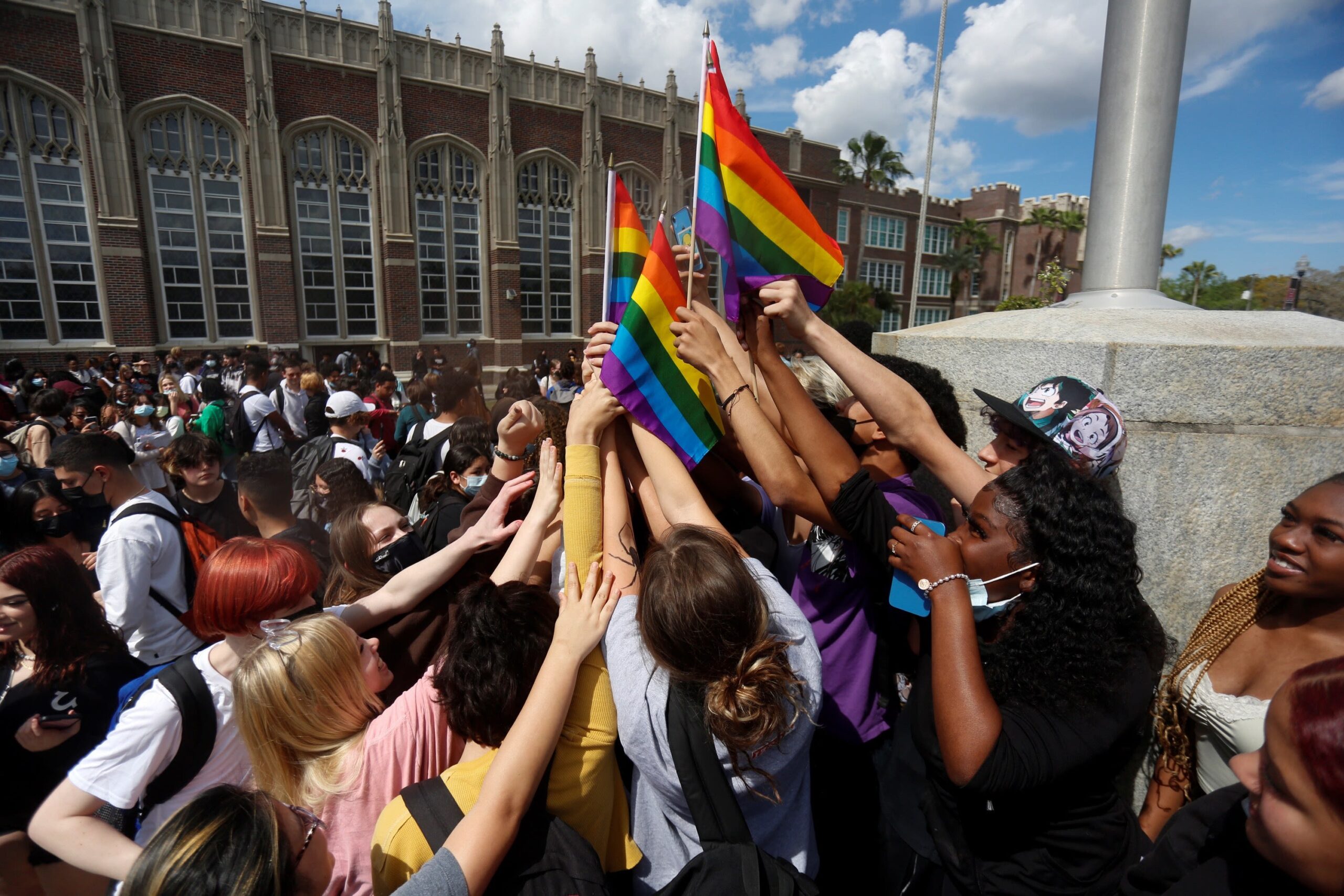
High school students protest a Republican-backed bill that would prohibit classroom discussion of sexual orientation and gender identity, in Tampa, Florida, on March 3, 2022. Octavio Jones/Reuters
How is the anti-gender movement being resisted?
It’s not all bad news. As the OURs report states: “Feminist movements around the world have also been building strategies and tactics to advance our agendas. In fact, many anti-rights strategies and tactics have been inspired by us!”
And so, people around the world continue to fight back against anti-gender ideology, with organizations, activists, and ordinary citizens mobilizing to continue advancing human rights. But being a human rights defender remains a dangerous business: many face threats, violence, and criminalization on a regular basis.
CNN has profiled 30 “defenders”. Find out who they are here: in English o en Español.
